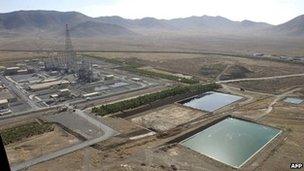John Kerry defends Iran nuclear deal to Congress sceptics
- Published
"We are committed to asking you for additional sanctions if we fail," Mr Kerry said
US Secretary of State John Kerry has defended the six-month nuclear deal struck with Iran to a sceptical panel of congressmen.
Mr Kerry said if the US Congress imposed new sanctions against Iran, it would risk the "delicate" diplomatic effort needed for a larger deal.
The US and other world powers have promised no new sanctions in exchange for a curb of Iran's nuclear programme.
But US critics of the deal say it gives Iran cover to expand the programme.
And they have called for even tougher sanctions now, saying they would strengthen the hand of the so-called P5+1 group of nations engaged in negotiations with Iran.
Some world powers say Iran's uranium enrichment programme is geared towards making a weapon, but Tehran insists it is only for peaceful purposes such as generating nuclear energy.
On Tuesday, Mr Kerry told the House foreign affairs committee the six-month deal, agreed in late November, had increased the security of the US.
"I would state to you unequivocally, the answer is yes, the national security of the United States is stronger under this first-step agreement than it was before," Mr Kerry said.
Mr Kerry and Treasury Secretary Jack Lew will hold a classified briefing on Iran for the full US Senate on Wednesday.
As part of the deal, inspectors from the UN's nuclear agency visited Iran's Arak heavy water production plant on Sunday for the first time in more than two years.
'Not saying never'
During the hearing in the House foreign affairs committee, Mr Kerry was accused of grovelling to the Iranian government and letting down allies, the BBC's Jonny Dymond reports.
But our correspondent says Mr Kerry pushed back against every suggestion of weakness on Iran, stressing that without a deal, the country would be closer to developing nuclear weapons.
"We are asking you to give our negotiators and our experts the time and the space to do their jobs and that includes asking you while we negotiate that you hold off imposing new sanctions," Mr Kerry told the panel.
"I am not saying never. If this doesn't work, we are coming back and asking you for more. I am just saying not right now," he added. "This is a very delicate diplomatic moment."
The Obama administration has faced scepticism from both parties in Congress. The House of Representatives passed a new sanctions scheme in July by a vote of 400 to 20.
Meanwhile, the Democrat-controlled Senate has moved more slowly on fresh sanctions legislation.
Two senators are reportedly close to completing a bill to require the White House to certify Iran's adherence to the Geneva plan every 30 days.
Meanwhile, the chairman of the Senate banking committee said on Tuesday the panel would hold off on advancing a new Iran sanctions bill.
"The President and Secretary Kerry have made a strong case for a pause in congressional action on new Iran sanctions, so I am inclined to support their request and hold off on committee action for now," chairman Tim Johnson said in a statement to the BBC.
On Tuesday, the House foreign affairs committee's top Democrat, Representative Eliot Engel, said he had "serious reservations about the agreement" because it did not completely stop enrichment.

Inspectors visited the Arak heavy water production plant for the first time in two years on Sunday
Mr Engel told Mr Kerry he thought the US would have more leverage with more sanctions.
"I think it could potentially strengthen your hand with a good cop, bad cop scenario," Mr Engel said.
Republican legislators expressed harsher criticism of the Geneva agreement.
Representative Ileana Ros-Lehtinen called it a "bad deal" and panel chairman Ed Royce said the US "may have bargained away our fundamental position".
But Mr Kerry urged the House to hold off.
"I don't want to give the Iranians a public excuse to flout the agreement," Mr Kerry said. "It could lead our international partners to think that we're not an honest broker."
Iran's foreign minister Mohammad Zarif has warned any new package of commercial restrictions would kill the deal.
"If Congress adopts sanctions, it shows lack of seriousness and lack of a desire to achieve a resolution on the part of the United States," Mr Zarif told Time magazine.
- Published20 January 2014
- Published8 December 2013